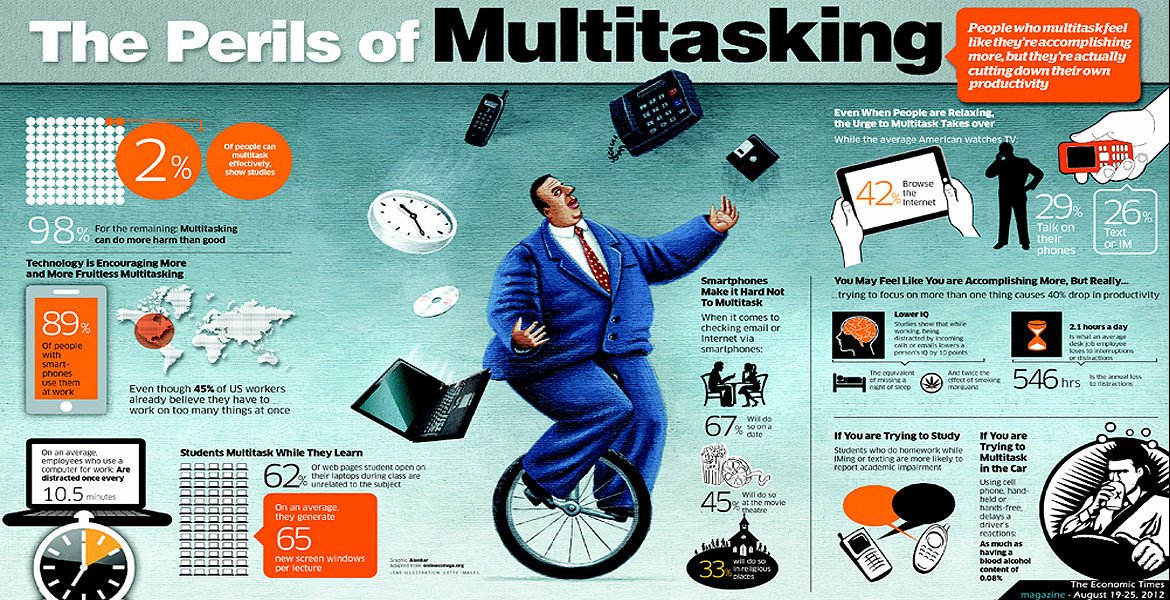
Is multitasking just hype
There is new research stating that we aren't as good as we think we are at doing several things at once.
But but what we can do gave us an evolutionary edge. Some argue that humans can not simultaneously read and listen, but just look at musicians... they read sheet music in front of them, listen, react, and adjust simultaneously.
So who is right?
Many researchers are now saying we don't do several things simultaneously, we simply switch our attention from task to task extremely quickly.

Technology is actually what allows us to do far more tasks at the same time, but are we really multitasking or have we just learned to switch attention very quickly? But the brain is very good at deluding itself... and we just believe we are doing tasks simultaneously. For example; we answer e-mails while on the phone (but are we really continuously listening or just trying to catch bullet points in the conversation). We type and schedule appointments on our phones while driving and listening to the radio and it seems as if we're actually focusing on all these tasks simultaneously, but if we were there would be far fewer text and crash incidents... the crash was due to a lack of attention to the main objective and circumstances we merely think we are still focusing on.
Brain researchers say that multitasking is a Human Delusion
Neuroscientist Earl Miller, a Picower professor of neuroscience at MIT, says that "for the most part, we simply can't focus on more than one thing at a time. What we can do, he said, is shift our focus from one thing to the next with astonishing speed".
A Role In Evolution
The assumption is that humans probably evolved into this rapid focal switching as they were quite vulnerable, physically compared to other animals around us. It must have developed to avoid, survive and hunt the animals that were bigger and stronger than us. Animals have a stronger single focus, they are either in fight or flight mode, whereas humans have additional options they can switch to... and switching is the key phrase, as we do not run and fight at the same time.
But scientists believe we may be too confident in our own skill of mental focal switching and that we frequently overestimate our ability to handle multiple tasks... and why the car crashes mentioned above occur.
Can continuous multitasking attempts harm the brain?

Stanford researchers have extensively compared groups of people that believed multi tasking helped their performance and found they were actually worse at multitasking than those who usually performed single tasks with focus. They found the frequent "multitaskers" had much lower performance levels as they had more trouble organizing their thoughts, filtering out irrelevant information and were even slower at switching from task to task. The conclusion was that multitasking reduces your efficiency and performance as the brain lacks the capacity to perform both tasks successfully.
The study also concluded that, in addition to slowing your mind and skill levels down, multitasking lowered the IQ. In fact continued studies at the University of London found that the participants who multitasked (especially with cognitive tasks) experienced IQ score declines similar to those that had smoked marijuana or stayed up all night.
The Scary Part

Findings for IQ drops of 15 points for multitasking men lowered scores to the average of an 8-year-old child. However it was long believed that this cognitive impairment from multitasking was only temporary, but the new research suggests the opposite. Research from the University of Sussex, UK, compared the time people spend on multiple devices (like texting while watching TV) with MRI scans of their brains. The findings were that high multitaskers actually had less brain density in the anterior cingulate cortex, this is a region of the brain responsible for empathy, cognitive and emotional control.
While more research is still needed to determine if multitasking is actually causing physical damage to the brain, it is clear that multitasking has negative effects. Neuroscientists also feel that the way we are interacting with our devices and increased life demand, might be changing the way we think at the level of the brain structure itself.
.
.
.

 Good Health – Evan Pantazi
#Kyusho
Good Health – Evan Pantazi
#Kyusho
Image Credit: globaldigitalcitizen.org, noshtradamus, businessinsider, imgarcade
